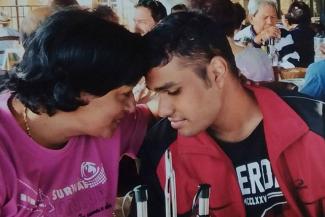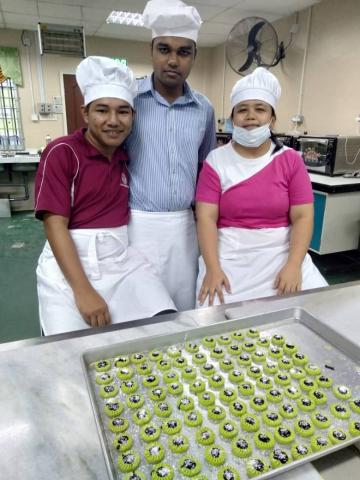
Dr Renuka Nambiar, based in Malaysia talks about her son Sanjeev, who was diagnosed with Autism when he was 4 years old. She talks about all the love and effort the family put together to make Sanjeev a person of his own today.
Please tell us a bit about your son’s condition:
Sanjeev was born in 1994. He was diagnosed Autistic with comorbid Epilepsy when he was 4 years old.
What were the early symptoms?
He was a normally developing child who reached all his developmental milestones on time, except for speech. At the age of 2 and a half years, he had a vocabulary of about 50 simple words only. I knew there was some problem, because his older twin brothers were actually reading simple books at the age of two and a half years.
Please describe your experience of managing the condition?
He did not learn to speak as a normal person would, he merely used single words and took refuge in pointing fingers. At the age of about 6 years, he started having absence seizures. These became full blown epilepsy of the tonic clonic type when he was about 11 years. Initially he was very hyperactive. I spent the early years from 4 to 6, doing the ABA method of teaching him. That’s how he learnt to sit at the table for longer than 5 minutes, and started learning alphabets and numbers. Around the same time, I employed Speech and Hearing graduates to work with him. I had a time table made for him which covered academics, reading, writing, math, along with fun activities such as jigsaw puzzles and coloring. He also had to learn music, exercise, gardening and basic living skills. This continued till he finished grade 6 at school. He went to a regular school along with an aide, who sat with him in the classroom. He did not attend school after grade 6. But he was homeschooled.
Is your son on any medication? If so, could you tell us what they are? Did the medicines help in any way?
He has been on anti epileptics since he started having seizures. I have also tried Ayurveda, Homoeopathy, Acupuncture, Enzyme therapy and GFCF diet for him. Out of all this, the only thing which really helped him was the GFCF diet.
GFCF diet had huge benefits for Sanjeev when he was younger, It reduced his hyperactivity immensely. In fact when he did become hyperactive, I actually went through his food diary. I would invariably find the "offender" food. Yes! I maintained a food diary for him. Everything he ate or drank was recorded. His everyday behavior also went into the diary. So, I could pin point the behavior changes when there was some inadvertent consumption of food off his diet. He was on this diet for about 12 years. But, once Sanjeev was about 15-16 years, I gradually reintroduced all the food. Now, he is totally off diet!
Currently he is still on anti epileptics and 5 HTP. 5 HTP was added about 4 months ago and it helps him to remain calm.
Were there any side-effects of the medicines?
He has tremors in his fingers as a side effect. He has also developed alopecia (severe loss of hair)
What were the challenges you faced while looking after your son?
When he was younger, it was difficult because he needed a rigid routine. Some evenings when we would return home, he would have a meltdown. Only after a few weeks we realized he had a meltdown because the neighbor’s car was not parked in the usual place! He had the habit of running around the house after we got back home. He would do that, even in heavy rain. He used to go to the park every evening where he played the monkey bars. Once he had a fall from there, had a cracked bone, he was in severe pain, but still insisted on playing the monkey bars! He used to be terribly constipated. He had a severe phobia of sitting on the toilet seat. I had to hug him tightly to me, while he attempted to move his bowels. Then it occured to me, he was afraid of the flushing! Once I reassured him on that, and let him flush the toilet without him having used the toilet, he would sit down on the toilet seat.
He was extremely picky in his eating habits. He would eat fried eggs and chicken sausages for every meal. He went to stay with his aunt for a few months when he was about 7. After that, he was eating more of a balanced diet of rice, bread, vegetables, meat and fruits. Once or twice a month, he does not sleep the entire night. Those times, we have to be awake to make sure he is okay. He has had seizures in his sleep as well. So, that is another big challenge.
How did you ensure that he has a life which is as close to normal as possible?
I included him in everything the family did. I took him everywhere. Functions, parties, holidays, weddings. Everywhere! I gave him much more time than his older siblings, but he needed that. I even went to the extent of having ready brochures about autism information in my handbag, whenever we traveled. Once in an airport while waiting for the flight, Sanjeev had a meltdown. Everyone was staring, and giving contemptuous looks at me. I just got up with my son in tow, and distributed the brochures to all who were staring!
How does he keep himself occupied?
Now that he is an adult, he loves to write, read, play computer games, listen to songs, paint, cook and make bead bracelets.
What were the challenges he faced when he stepped out into the outside world as opposed to being in the confines of his home? How did he overcome them?
There is no definite transition here. Since, from the time he was little he went out everywhere. Part of the curriculum I had designed for him, were visits to the bank, market, post office etc. People stared when we went outside, because of Sanjeev's stims (self-stimulatory behaviour) of moving and flapping his hands, gritting his teeth and awkward gait. Now that he is an adult, he regulates himself more and does not flap his hands or do anything to attract attention to himself.
Are there any special facilities available to you in the city/country of your residence?
When he was younger, I did take him to a special school. There were about 30 kids with different special needs there, with one teacher taking care of them. She had the TV turned on right in front of the classroom. The students were not paying attention to the TV, or to each other or to the teacher. I decided then and there, this was not where Sanjeev would thrive. So, I had to fight my way through the school system to have him in a regular school with an aide. But now, after two decades, facilities are better here in Malaysia I guess. There is more awareness if not acceptance!
The best thing which happened to Sanjeev was the Community College here, which had a special Diploma course in Basic Pastry making. He has finished the three semesters at college, and he is doing the last semester which consists of practical experience in the food industry. Right now, he is working in a fast food restaurant. He will finish the practical training next month, and with this completed, he will graduate next year.

How do you think Sanjeev has coped with the challenges?
Every day is a challenge for him. He has minimal speech, does not have the ability to express himself fully. I am his voice. I am his extension. He functions in a regular world although not fully equipped to handle the dynamic changes occurring around him. This in itself is a testimony of his grit and resilience. He has come a long, long way.
Have you learnt anything in managing your son’s condition that you wish you knew before?
Right from his diagnosis, I have kept abreast of what was available in the form of treatment methods. I can say, I have given him all I could, all that was available at the time when he was growing up. Most of all, I have given my undivided time, faith in his potential, and unconditional love. I have no regrets.
What kind of specialists do you consult and how often?
He is on regular follow up with a Neurologist for his epilepsy. But since Sanjeev's parents and both his older twin brothers are doctors, between us, we manage his condition. Right now I am using the RDI program with him since the last three years. I meet the consultant every week for a Skype session about Sanjeev. We meet her once a year for a consultation.
Are there myths regarding autism which need to be busted?
This question brings tears and laughter at the same time. My heart breaks at the lack of understanding people have about Autism. When he was in primary school parents of other children made sure their children did not sit anywhere next to Sanjeev. As if their children would catch autism by sitting next to Sanjeev! They invariably think, autism means a violent individual. I was trying to book a taxi to send Sanjeev to his college. The taxi driver who came to see me about this, refused to take the job. "What if he grabs my neck while I am driving?" he said! The most important myth I want to bust is the belief that autism means the end of the world. The myth that there is no hope. There is hope. If there is ONE thing I want to tell parents of autistic children, especially parents of newly diagnosed children. Never, EVER lose hope. Believe in your child's potential. They are far more intelligent than we give them credit for.
Have you had to make changes to your lifestyle because of your condition?
Oh, Yes! Life at home revolves around Sanjeev. When he was younger, I went to my clinic during his nap times, the rest of the time, I was with him, teaching him, playing with him, singing to him. When he was on a strict GFCF diet, we all did not eat his restricted diet in front of him. Going out for dinner or visiting friends and family was difficult because of his diet. As an adult now, we have to take him along to all our medical conferences. We need to get prior permission from the organizers, since he cannot be left alone at home. We take him along for our College reunions as well. He is like the Amex card. We never leave home without him!






